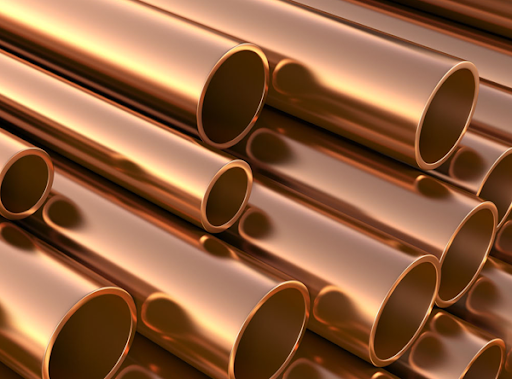Copper Piping?
Copper is a metal that is obtained naturally in its raw form. By refining and cleansing the metal, it is transformed into pure copper. Copper has an irregular shape and a reddish-orange color when it is found in its raw form. One advantage of copper is that it is softer than other metals, allowing it to be formed and fabricated with ease and without much effort.
The metal is extremely ductile. Copper contains trace amounts of manganese and iron. Copper is used in a variety of applications. It is used to make pipes, tubes, bars, rods, sheets, wire, and other similar items. Copper is not strong enough on its own, but heat and cold treatment make it more durable. Copper, on the other hand, is sensitive to certain conditions.
What is Copper?
Copper is a metal that is procured in its crude form naturally. The metal is converted into proper copper by refining and cleansing. When copper is found in its crude form, it has an irregular shape and a reddish-orange color. One good thing about copper is that it is softer when compared to other metals, which can be formed and fabricated with ease and without any great effort.
The metal is very ductile. Copper consists of manganese and iron in small proportions. Copper is used in many applications. It is used to make pipes, tubes, bars, rods, sheets, wire, etc. A copper is not strong enough, but heat and cold treating make it durable. The copper is, however, sensitive to certain conditions.
What is Protective Coating of Copper Pipe?
Copper, in any form, is corrosive, so it is critical to apply a protective coating to copper pipes. The appearance of a protective coating on a copper pipe is simply done to ensure that the entire unit is protected from harsh environmental conditions, such as in wastewater treatment plants, food plants, commercial buildings near coastlines, and other harsh environments where corrosion can begin in just a few months. The coating protects the pipe from harsh conditions or applications. Copper pipes are primarily used in the piping systems of homes, buildings, industries, and factories. The coating is very important in general because it benefits the metal itself, regardless of the metal.
Any metal’s coating protects it from corrosion, which is caused by water, gas, exposure to the environment, and other factors. Coatings are classified into four types, namely, One such thing is a barrier coating, which prevents water, oxygen, and electrolytes from coming into contact with the metal. Second, an inhibitory coating is applied to the metals to prevent chemicals from interacting with them. Galvanic protection is provided by sacrificial coatings. In other words, they corrode rather than the underlying metal, supplying electrons that reverse the corrosion cell and convert anodes to cathodes. A “combination coating” simply means a combination of different coatings. Copper pipes are more prone to corrosion, so coating the entire piping system with copper would be a great idea as it would extend the life of the pipe, making it more durable.
Applications of Copper Pipes
Copper pipes are commonly used in applications such as water supply, construction, utilities, and sewage. It is also widely used because of its strength and durability. Copper pipes are coated for protection and are used in the chemical and oil and gas industries to transport products from one location to another. Copper is heavily used in industries such as food and beverage because of its ability to prevent leakage and contamination. This industry also uses copper vessels to store products, but all of them must be washed on a regular basis because sanitation is a top priority in the food and beverage and medical device industries.
Copper pipes are commonly used in the following industries: textile machinery, chemicals, fertilizers, dairy, and food processing, power plants, pesticides, construction, modern architecture, pharmaceuticals, sugar, oil, and gas processing.
